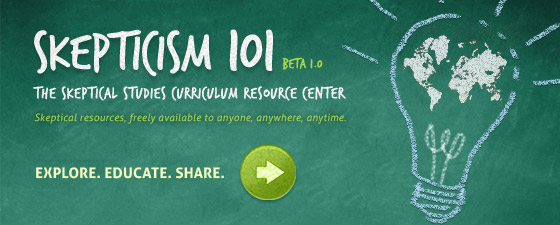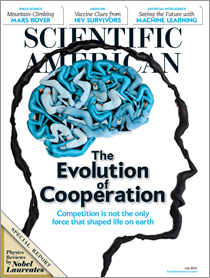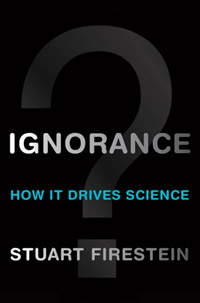Report from the Front Lines at TAM and Freedom Fest
By “rich” I mean intellectually, of course, because as all skeptics know, the laws of probability are precisely employed by all Las Vegas casinos to insure that if you play long enough the money in your pocket will end up in their coffers. It is not for nothing that it is called Lost Wages.
Actually, there are two ways to win at gambling. You can do it the way I did after the final session at TAM Sunday: play for a brief period of time and quit when you are ahead. I started with $200 at a $5 minimum Blackjack table. For around 20 minutes I bounced around between $150 and $250 in chips artfully stacked in front of me as I pretended to be a big spender. The inevitable losing streak then kicked in and I was suddenly down below $50, then clawed my way back up to $228 when it was time to go, saving myself from the over-confidence bias that would have, in time, left me with nothing but green cloth beneath my empty palms. (The other way to win at gambling in Las Vegas? Be the owner of a casino.) (continue reading…)
Comments Off on Leaving Las Vegas … Rich
Or: What it was Like Teaching a Course in Skepticism 101?

On March 31, 2011, I debated Deepak Chopra at Chapman University on “The Nature of Reality” that also featured Stuart Hameroff, Leonard Mlodinow, and several other commentators, all choreographed by the Chancellor of Chapman University, mathematician Daniele Struppa. In the greenroom before the debate Dr. Struppa was reviewing my bio and noted that I am an adjunct professor at Claremont Graduate University and made a comment that I should be an adjunct professor at Chapman as well. I said something like “sure, why not?” and when he introduced me on stage he said something about how I might also one day teach there. Daniele said I could teach anything I want as part of their Freshman Foundations Courses, so I suggested a course on Skepticism 101, or how to think like a scientist (without being a geek). I taught it the Fall semester of 2011 to 35 incoming Freshman students and it was a blast. (continue reading…)
Comments Off on How to Learn to Think Like a Scientist (Without Being a Geek)
The death of the brain means subjective experiences
are neurochemistry

“WHERE IS THE EXPERIENCE OF RED IN YOUR BRAIN?” The question was put to me by Deepak Chopra at his Sages and Scientists Symposium in Carlsbad, Calif., on March 3. A posse of presenters argued that the lack of a complete theory by neuroscientists regarding how neural activity translates into conscious experiences (such as “redness”) means that a physicalist approach is inadequate or wrong. “The idea that subjective experience is a result of electrochemical activity remains a hypothesis,” Chop ra elaborated in an e-mail. “It is as much of a speculation as the idea that consciousness is fundamental and that it causes brain activity and creates the properties and objects of the material world.” “Where is Aunt Millie’s mind when her brain dies of Alzheimer’s?” I countered to Chopra. “Aunt Millie was an impermanent pattern of behavior of the universe and returned to the potential she emerged from,” Chopra rejoined. “In the philosophic framework of Eastern traditions, ego identity is an illusion and the goal of enlightenment is to transcend to a more universal non local, nonmaterial identity.” (continue reading…)
read or write comments (14)
This review of Ignorance: How it Drives Science by Stuart Firestein (Oxford University Press, May 2012, ISBN 13: 97801-998-28074) was originally published in Nature, 484, 446–447 (26 April 2012) as “Philosophy: What we don’t know.”
At a press conference on February 12, 2002, the United State Secretary of Defense Donald Rumsfeld employed epistemology to the explain U.S. foreign entanglements and their unintended consequences: “There are known knowns. There are things we know we know. We also know there are known unknowns. That is to say, we know there are some things we do not know. But there are also unknown unknowns, the ones we don’t know we don’t know.”

It is this latter category especially that is the focus of Stuart Firestein’s sparkling and innovative look at ignorance, and how it propels the scientific process forward. Firestein is Professor and Chair of the Department of Biological Sciences at Columbia University, where he teaches a wildly popular course on ignorance, inviting scientists in as guest speakers to tell students not what they know but what they don’t know, and even what they don’t know that they don’t know. (Would you rather earn an A or an F in a class called “Ignorance”?, he muses.) This is a slim volume about a fat topic, but Firestein captures the essence of the problem by contrasting the public’s understanding of science as a step-wise systematic algorithm of grinding through experiments that churn out data sets to be analyzed statistically and published in peer-reviewed journals after a process of observation, hypothesis, manipulation, further observation, and new hypothesis testing, with the Princeton University mathematician Andrew Wiles’ description of science as “groping and probing and poking, and some bumbling and bungling, and then a switch is discovered, often by accident, and the light is lit, and everyone says, ‘Oh, wow, so that’s how it looks,’ and then it’s off into the next dark room, looking for the next mysterious black feline” (p. 2), in reference to the old proverb: “It is very difficult to find a black cat in a dark room. Especially when there is no cat.” (continue reading…)
Comments Off on The Unknown Unknowns
Where in the world are the atheists? That is, in what part of the globe will one find the most people who do not believe in God? Answer: East Germany at 52.1%. The least? The Philippines at less than 1%. Predictably, strong belief shows a reverse pattern: 84% in the Philippines to 4% in Japan, with East Germany at the second lowest in strong belief at 8%. Not surprising, those who believe in a personal God “who concerns himself with every human being personally” is lowest in East Germany at 8% and highest in the Philippines at 92%.
These numbers, and others, were collected and crunched by Tom W. Smith of the National Opinion Research Center (NORC) at the University of Chicago, in a paper entitled “Beliefs About God Across Time and Countries,” produced for the International Social Survey Programme (ISSP) and released on April 18, 2012. Smith writes: “Countries with high atheism (and low strong belief) tend to be ex-Socialist states and countries in northwest Europe. Countries with low atheism and high strong belief tend to be Catholic societies, especially in the developing world, plus the United States, Israel, and Orthodox Cyprus.”
Many religious scholars invoke the “secularization thesis” to explain lower religiosity in Northern European countries (compared to the United States) in which mass education, especially in the sciences, coupled to the fact that governments do what religions traditionally did in the past in taking care of the poor and needy. With a tight social safety net religions simply fall into disuse; with a porous social safety net people fall through the cracks and are picked up by religions. Other scholars have suggested a “supply side” explanation for the difference between the U.S. and Europe, in which churches and religions in America must compete for limited resources and customers and thus have ratcheted up the quality of religious products and services: mega churches with rock music, baby sitting, BBQs, and even free parking! Smith seems to find evidence of both forces at work, noting that “In the case of Poland, it appears that its strong Catholicism trumps the secularizing influence of Socialism,” whereas elsewhere in the world “there is also evidence that religious competition and/or religious conflict may stimulate higher belief.” (continue reading…)
Comments Off on Atheist Nation




